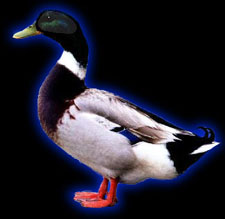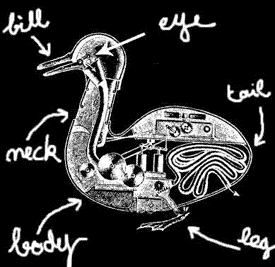
|
|
"A duck is one of the most beautiful animals. If you study a duck, you'll see certain things: the bill is a certain texture and a certain length; the head is a certain shape; the texture of the bill is very smooth and it has quite precise detail and reminds you somewhat of the legs (the legs are a little more rubbery). The body is big, softer, and the texture isn't so detailed. The key to the whole duck is the eye and where it is placed. It's like a little jewel. It's so perfectly placed to show off a jewel - right in the middle of the head, next to this S-curve with the bill sitting out in front, but with enough distance so that the eye is very well secluded and set out. When you're working on a film, a lot of times you can get the bill and the legs and the body and everything, but this eye of the duck is a certain scene, this jewel, that if it's there, it's absolutely beautiful. It's just fantastic." David Lynch |
|
"The eye of the duck"
David Lynch uses this phrase to refer to his idea that to get a sense of the overall state of being of a duck, you need to look at a duck's eye. No other spot on a duck is as good a place to look if you really want to know the duck. And Lynch argues that there are scenes like that in every film.
In this film I believe that scene is the extended scene that begins with Diane answering the phone near the red lampshade, with the look on Diane's lonely face while her phone is ringing. Clearly that look tells us she has suffered at the hands of that sweet voice that begins talking when the answering machine answers the phone. And yet Diane takes the call anyway and hesitantly agrees to trust Camilla with her heart one more time, still trying to be hopeful that the love she is seeking can still be found. The arch of Diane's life is all there. Her fear of being abused, her attempts to find love by repressing memories of past abuse, her reentering into abusive relationships, and finally, her growing broken and ruined emotional state after suffering new abuses and betrayal. -
(Alan Shaw)
